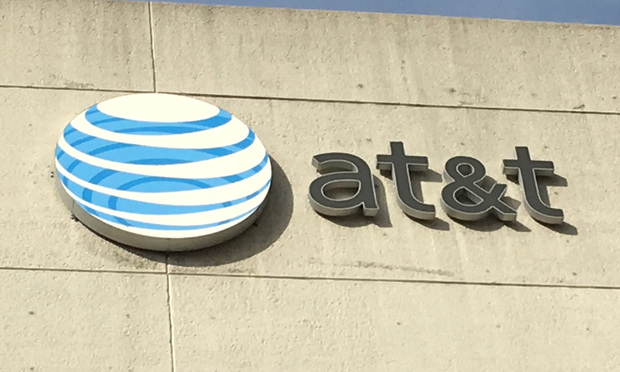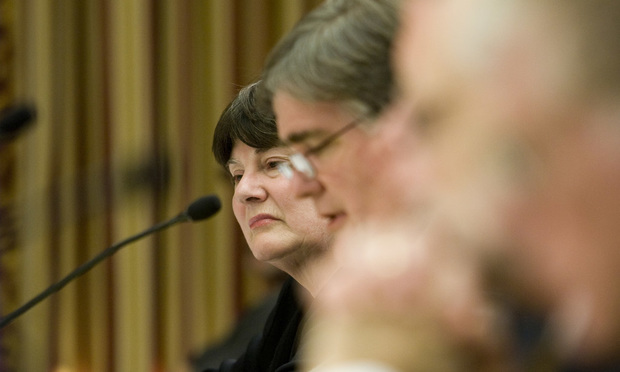FTC's Power to Regulate Mobile Phone Industry Gets a Boost
"New technologies have spawned new regulatory challenges. A phone company is no longer just a phone company," Ninth Circuit Judge M. Margaret McKeown wrote Monday for the unanimous en banc panel.
February 26, 2018 at 02:05 PM
5 minute read
 AT&T. (Credit: John Disney/ ALM)
AT&T. (Credit: John Disney/ ALM) A federal appeals court on Monday affirmed that the Federal Trade Commission has the power to challenge AT&T Mobility's so-called data throttling of customer services, reversing an earlier ruling that threatened to curb the agency's authority to regulate the mobile phone industry.
The FTC alleged in 2014 that AT&T had misled millions of smartphone consumers by charging them for unlimited data plans while slowing down their data speeds after they reached a certain amount of data use in a billing cycle. In some cases, AT&T's throttling rendered several common phone applications, such as GPS navigation and video streaming, nearly impossible to use, according to the FTC's lawsuit.
AT&T, represented by lawyers at Kellogg, Huber, Hansen, Todd, Evans & Figel and Sidley Austin, argued that as a common carrier it was not subject to the FTC's authority. U.S. District Judge Edward Chen in California rejected that defense, ruling that the FTC Act's exemption for common carriers did not apply to activities that fall outside of common carrier services, such as data service.
Chen was later overruled, in 2016, by a three-judge panel of the U.S. Court of Appeals for the Ninth Circuit. In an 11-0 ruling Wednesday, the Ninth Circuit overturned that 2016 panel decision. None of the three Ninth Circuit judges involved in the earlier decision were on the en banc panel.
“The FTC is the leading federal consumer protection agency and, for many decades, has been the chief federal agency on privacy policy and enforcement. Permitting the FTC to oversee unfair and deceptive non-common-carriage practices of telecommunications companies has practical ramifications,” Judge M. Margaret McKeown wrote. “New technologies have spawned new regulatory challenges. A phone company is no longer just a phone company.”
 Judge M. Margaret McKeown of the U.S. Courts of Appeals for the Ninth Circuit (2009) Photo by Diego M. Radzinschi/NATIONAL LAW JOURNAL
Judge M. Margaret McKeown of the U.S. Courts of Appeals for the Ninth Circuit (2009) Photo by Diego M. Radzinschi/NATIONAL LAW JOURNAL McKeown continued:
“The transformation of information services and the ubiquity of digital technology mean that telecommunications operators have expanded into website operation, video distribution, news and entertainment production, interactive entertainment services and devices, home security and more. Reaffirming FTC jurisdiction over activities that fall outside of common-carrier services avoids regulatory gaps and provides consistency and predictability in regulatory enforcement.”
Michael Kellogg, who argued for AT&T in the Ninth Circuit, was not immediately reached for comment Monday. “Today's decision on jurisdiction does not address the merits of the case. We are reviewing the opinion and continue to believe we ultimately will prevail,” AT&T said in a prepared statement.
Maureen Ohlhausen, acting Federal Trade Commission chair, said in a statement: “I welcome the Ninth Circuit's ruling as good news for consumers. It ensures that the FTC can and will continue to play its vital role in safeguarding consumer interests including privacy protection, as well as stopping anticompetitive market behavior.”
The FTC alleged AT&T's throttling began in 2011 and affected at least 3.5 million customers. The company had stopped offering unlimited plans in 2010, but legacy customers who had signed up for the service were grandfathered and allowed to keep their plans.
According to the FTC, AT&T failed to inform those consumers of the throttling program when they renewed their plans. And when consumers canceled their plans after being throttled, they were charged early termination fees that typically cost hundreds of dollars, according to the FTC.
As the case between AT&T and the FTC played out, broadband internet service's status as a common carrier service has twisted in the winds of political change.
In 2015, the Federal Communications Commission reclassified broadband internet as a common carrier service, in a move intended to prevent companies from throttling. The FCC reversed that 2015 reclassification earlier this year under the leadership of Chairman Ajit Pai, a Republican.
In a footnote Wednesday, the Ninth Circuit said that the FCC's recent move did not render the case moot. “The 2018 order explicitly stated that it applies 'only on a prospective basis,'” McKeown wrote.
“The FTC derived its jurisdiction from the FTC Act, and neither of the FCC's Reclassification Orders applies retroactively,” McKeown said.
This post was updated with additional comment about the ruling.
The Ninth Circuit's ruling is posted below:
This content has been archived. It is available through our partners, LexisNexis® and Bloomberg Law.
To view this content, please continue to their sites.
Not a Lexis Subscriber?
Subscribe Now
Not a Bloomberg Law Subscriber?
Subscribe Now
NOT FOR REPRINT
© 2025 ALM Global, LLC, All Rights Reserved. Request academic re-use from www.copyright.com. All other uses, submit a request to [email protected]. For more information visit Asset & Logo Licensing.
You Might Like
View All
'Where Were the Lawyers?' Judge Blocks Trump's Birthright Citizenship Order
3 minute read
Netflix Music Guru Becomes First GC of Startup Helping Independent Artists Monetize Catalogs
2 minute read
K&L Gates Files String of Suits Against Electronics Manufacturer's Competitors, Brightness Misrepresentations
3 minute read
Holland & Knight Hires Former Davis Wright Tremaine Managing Partner in Seattle
3 minute readTrending Stories
Who Got The Work
J. Brugh Lower of Gibbons has entered an appearance for industrial equipment supplier Devco Corporation in a pending trademark infringement lawsuit. The suit, accusing the defendant of selling knock-off Graco products, was filed Dec. 18 in New Jersey District Court by Rivkin Radler on behalf of Graco Inc. and Graco Minnesota. The case, assigned to U.S. District Judge Zahid N. Quraishi, is 3:24-cv-11294, Graco Inc. et al v. Devco Corporation.
Who Got The Work
Rebecca Maller-Stein and Kent A. Yalowitz of Arnold & Porter Kaye Scholer have entered their appearances for Hanaco Venture Capital and its executives, Lior Prosor and David Frankel, in a pending securities lawsuit. The action, filed on Dec. 24 in New York Southern District Court by Zell, Aron & Co. on behalf of Goldeneye Advisors, accuses the defendants of negligently and fraudulently managing the plaintiff's $1 million investment. The case, assigned to U.S. District Judge Vernon S. Broderick, is 1:24-cv-09918, Goldeneye Advisors, LLC v. Hanaco Venture Capital, Ltd. et al.
Who Got The Work
Attorneys from A&O Shearman has stepped in as defense counsel for Toronto-Dominion Bank and other defendants in a pending securities class action. The suit, filed Dec. 11 in New York Southern District Court by Bleichmar Fonti & Auld, accuses the defendants of concealing the bank's 'pervasive' deficiencies in regards to its compliance with the Bank Secrecy Act and the quality of its anti-money laundering controls. The case, assigned to U.S. District Judge Arun Subramanian, is 1:24-cv-09445, Gonzalez v. The Toronto-Dominion Bank et al.
Who Got The Work
Crown Castle International, a Pennsylvania company providing shared communications infrastructure, has turned to Luke D. Wolf of Gordon Rees Scully Mansukhani to fend off a pending breach-of-contract lawsuit. The court action, filed Nov. 25 in Michigan Eastern District Court by Hooper Hathaway PC on behalf of The Town Residences LLC, accuses Crown Castle of failing to transfer approximately $30,000 in utility payments from T-Mobile in breach of a roof-top lease and assignment agreement. The case, assigned to U.S. District Judge Susan K. Declercq, is 2:24-cv-13131, The Town Residences LLC v. T-Mobile US, Inc. et al.
Who Got The Work
Wilfred P. Coronato and Daniel M. Schwartz of McCarter & English have stepped in as defense counsel to Electrolux Home Products Inc. in a pending product liability lawsuit. The court action, filed Nov. 26 in New York Eastern District Court by Poulos Lopiccolo PC and Nagel Rice LLP on behalf of David Stern, alleges that the defendant's refrigerators’ drawers and shelving repeatedly break and fall apart within months after purchase. The case, assigned to U.S. District Judge Joan M. Azrack, is 2:24-cv-08204, Stern v. Electrolux Home Products, Inc.
Featured Firms
Law Offices of Gary Martin Hays & Associates, P.C.
(470) 294-1674
Law Offices of Mark E. Salomone
(857) 444-6468
Smith & Hassler
(713) 739-1250






